“I played the real me in the end. The boy who said the prayer was Eric Linden. That was a very simple thing” (Parish 354).
It’s at the very end of Are These Our Children?, when Linden’s Eddie Brandt is moments from execution, that the young actor made audiences cry with his recitation of the Lord’s Prayer. It’s a melancholy ending, whitewashing Eddie’s wild ride to some extent, but fitting in another, as it works to bring his character full circle. “I thought I was smart,” he tells his grandmother (Beryl Mercer). “I thought I had to get money and drink.” Eddie Brandt’s fall is an extreme commentary on youth culture in the late Prohibition-era, but it’s also an extremely entertaining slice of life energized by regular visits to the dance hall and chop suey joint, sex, violence, and enough period lingo to start a thirties slang dictionary.
When a formerly cheerful and confident high school student flubs the big “oratorial contest,” Eddie’s response to “the big horse laugh” from his peers is to ditch his sweet girlfriend and loving grandmother in favor of a life filled with wine, women, and song. Scratch that: filled with booze, dames, and crime, up to and including murder.
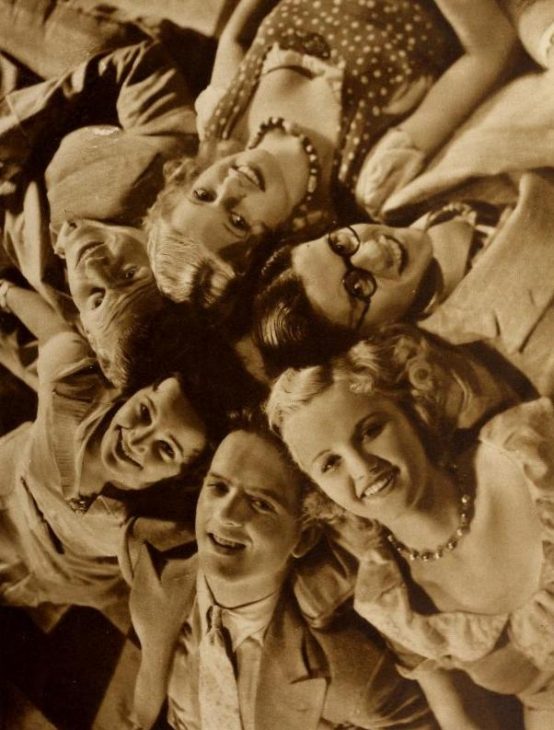
Above: The gang of six in a happy pose found in Cine-Mundial magazine, November 1931. Working counterclockwise from Eric Linden at the very bottom of the page are Arline Judge, Ben Alexander, Mary Kornman (of Our Gang fame), Bobby Quirk, and Roberta Gale.
“You’re going to see my name in all the papers some day. I’m going to be somebody!” Eddie declares at the start of Are These Our Children?. He makes good on his promise, breaking the hearts of his loved ones on his way to the death house.
“The picture never seems to make up its mind whether it is a sympathetic consideration of this particular boy or a denunciation of the generation to which he belongs,” Variety said in its review. Motion Picture Daily saw big business in the film’s mixed message, admitting, “‘Are These Our Children?’ is likely to be hailed both as a masterful preachment against the ‘wild youth’ of the day and, on the other hand, as a pessimistic picture of modern youngsters.”
Eddie Brandt is the all-American boy until he blows his high school oratorical contest. The other kids make fun of him, and Eddie comes home to declare he’s quitting school. He forgets all about his innocent girlfriend (Rochelle Hudson), and instead lets loose on the dance floor of the local chop suey joint with bad girl Flo (Arline Judge). Flo belongs to a wild pack of kids who soon have Eddie opting for Prohibition-era swill over his usual cool glass of milk. It’s not long before an animated graphic indicates a downward swirl, and Eddie’s whispering to his pals not to worry about having a gat, he’s got that covered.
Wild times eventually lead the kids—six in all, including our Eddie—over the bridge from Manhattan to Jamaica, Queens, where they realize they’re all out of booze. Luckily, they’re in Heinie Krantz’s neighborhood. Heinie (William Orlamond) is a bosom friend of Eddie’s grandmother, a regular presence around the family apartment, who loves Eddie as his own son. Through his haze Eddie remembers Heinie’s delicatessen is in the neighborhood, so he orders their cab to pull over and leads the other boys to Heinie’s while the girls wait in the taxi.
Eddie and his pals stumble through the snow until they reach Heinie’s storefront, where they pound on the darkened outside window until the old Dutchman finally gets out of bed to answer. After pushing their way in, Eddie plucks a pickle from a barrel and insists Heinie cough up any liquor he may have on the premises. Heinie resists, but Eddie’s too drunk to care. He rifles through a back room until he finds a bottle, which Heinie tries to keep from him. Moments later, Heinie lies dead.
“Heinie’s shot. Somebody’s killed him,” Eddie’s grandmother wails the next morning.
“Gee, that’s tough,” says Eddie. “Well, I guess it couldn’t be helped. People got to die.” His tone is casual, though mixed with some panic. He takes the newspaper and tries to change the subject: “Gee, I wonder who won that fight last night.”
What happened to the innocent kid from the beginning of the movie, who used to press dimes on his kid brother (Billy Butts), dote upon his grandmother, and kid around with harmless old Heinie? The fast life happened. Booze, fast girls, jazz bands, easy money. Eddie learns fast because this is the movies, and vice is easy.
This was Eric Linden’s first movie and probably his greatest success. I like Linden a lot as an actor, though enjoy him more with a bit of an edge as compared to his more virtuous portrayals. The always youthful looking Linden can come off as a bit whiny during some of his early films, especially when playing impossibly upright young men, but he has a way of clicking during a movie’s most dramatic moments that soon earned him a reputation as something of a young Cagney.
Linden is also very good in MGM’s adaptation of Eugene O’Neill’s Ah, Wilderness! (1936) a little later in his career. But how might he be remembered, and how much further might his career have extended, if he hadn’t been removed from RKO’s Little Women (1933), or if his work wasn’t shredded to just a few seconds on camera in Gone With the Wind (1939)?
That’s right, Eric Linden was in Gone With the Wind! He’s the wounded soldier who moans for a few seconds on camera before moaning even louder off camera while his legs are amputated. Linden only ever appeared in one movie after that, but he never seemed to think much of Hollywood anyway.
A difficult youth led to a series of odd jobs until his high school drama teacher spotted him in a movie theater, where he was usher. After giving Linden a lecture, she arranged for a friend to write him a letter of introduction to the Theatre Guild, where he played some small parts. He left the Guild in 1929, opting for a bit of travel that allowed him to latch on with the American Players in Paris, France. Linden stayed behind when the company returned to New York, and eventually worked his way back to America as part of the crew on board a cattle boat. Linden resumed acting upon his return to New York, but it was a radio serial—the lead in The Adventures of Dick Trevor—and not the stage which brought him to the attention of an RKO talent scout. RKO was seeking a lead for Are These Our Children?, and Linden scored the part by reading the Lord’s Prayer, a performance he repeats for all at the end of the movie.
“We will be seeing more of this Linden boy,” Motion Picture Herald said in response to Are These Our Children? “He has the goods.”
Are These Our Children? was the first of four movies Linden appeared in with co-star Arline Judge. Earlier that year Judge had bit roles in a handful of titles, including An American Tragedy, but Are These Our Children? marked her first screen billing. Judge later tried to pry Linden away from Helen Twelvetrees in Young Bride (1932), and they also appeared together for RKO in The Age of Consent (1932) and Flying Devils (1933).
Full of pep and personality that came across on screen, the young actress was a hot commodity at this time, but Arline Judge wound up most famous for the number of times she exchanged marriage vows. Judge married eight times in all, counting Are These Our Children? director Wesley Ruggles as husband number one. They wed shortly after completing production on the film. Judge was nineteen; Ruggles forty-two. This first marriage was the one that stuck longest for Judge, a whole five-and-one-half years into 1937. Judge squeezed in another seven marriages before divorcing for the eighth and final time towards the end of 1960.
But as Are These Our Children? goes to show, to remember Arline Judge only for her numerous trips to the altar is unfair. She excelled at playing the streetwise youth, young women who backed up the bluster of her forward language with an alluring sexuality that coaxed innocent young men—like those Linden often played—into her welcoming arms.
The films she appeared in with Linden were all entertaining, as were the titles she worked in for Ruggles while they were married: Roar of the Dragon (1932), Shoot the Works (1934), and Valiant Is the Word for Carrie (1936).Arline Judge appeared in over forty films during the busiest part of her career from 1931-1946. She also played the manicurist in Harold Lloyd’s final film The Sin of Harold Diddlebock aka Mad Wednesday (1947), and later had a part in The Crawling Hand (1964). Her few television credits included a spot in a 1964 episode of Perry Mason, though she also appeared in several television commercials. Arline Judge died of natural causes on February 7, 1974, two weeks before her sixty-second birthday.
Are These Our Children? serves as a great starting point for fans of either Linden or Judge, whose most successful screen personas are immediately established this first time out together. Linden’s innocence can grate, but once his head swells, he rates a first class jerk. “Hi, big boy,” Judge says when first greeting Linden in Are These Our Children? beginning her run as one the fastest, jazziest hidden delights of the pre-Code era. Judge brings her characters across as so smutty that you can almost believe that it wouldn’t take much more than one bad day at school to put a squeaky-clean young fellow under her thumb.
“Phew, am I hot,” Flo (Judge) says after a dance.
“I’ll say you’re hot,” Eddie replies.
“Feel?” Flo says, a request more than a question. She grabs Eddie’s hand and uses it to pat her neckline down to her chest.
“Uh oh, a hundred and eight,” says Eddie.
Sausage-man Heinie’s murder at the midpoint of the movie goes unsolved for weeks, making Eddie ever more confident that he’s going to get away with it. Best of all, Flo and the other kids know that it’s him the newspaper headlines are referring to in their daily coverage. “We’re getting more space than the President,” Eddie says of the papers. He’s famous!
The anonymous killers are headline news for four weeks before the jig is up. At first they were scared and careful, but after getting away with murder for so long the kids turn sloppy and, in Eddie’s case, cocky. He waves at Charlie the cop (Earl Pingree) from the dance floor and then fawns over his own anonymous infamy when the latest newspapers are dropped off at the chop suey joint. What Eddie doesn’t realize is that his pal Nick (Ben Alexander), leader of the gang before Eddie came along, has a thing for Flo, and is as jealous as he is scared.
But the group of six youths keep on partying. When they get back to their hang-out that night they’re so revved up that they take turns hooting and hollering as they slide down the staircase banister—you really have to see this bit, they’re absolutely smashed! When they finally enter their apartment, a group of police officers led by Charlie stand inside waiting for them. Their rampage is over.
But they’re not ready to cool their heels quite yet. Not Eddie, at least. They eat up their infamy, posing for photos as Eddie runs his mouth to the press. “Of course, if the police want to try to pin this on me,” Eddie says, “it just means I’ll stay on the front page. He mentions a possible future in politics. The press egg him on, winking at each other as the young blowhard thinks they’re falling for his spin.
Eddie winds up too smart for his own good. When he doesn’t like the way his lawyer is handling the case, he takes over and defends himself. It all falls apart when he calls Nick to the stand.
He wins a few more headlines, and then, finally, his humility after he’s visited by his grandmother and kid brother.
“I thought I was smart,” he repeats to his little brother. “But you can’t get away with it!”
Are These Our Children? did big business, tying First National’s Five Star Final for third place in Motion Picture Herald’s list of box office champions for November 1931. From the celebrated Cimarron (1931) creative team of director Wesley Ruggles and screenwriter Howard Estabrook, the movie brought praise and stardom to its young co-stars Linden and Judge. In addition to future Linden-Judge and Judge-Ruggles teamings, it’s worth noting that Ruggles and Estabrook also collaborated once more in their very next RKO feature, Roar of the Dragon (1932) starring Richard Dix.
On the basis of Are These Our Children?, RKO signed Linden to a long-term contract that guaranteed him leading man status in his movies. After Young Bride, he was loaned to Warner Bros., who tried to capitalize on that young Cagney reputation by casting him as Cagney’s younger brother in The Crowd Roars (1932). He did better in other loan outs to Warner’s for Life Begins and Big City Blues (both 1932). Linden appeared in just over a dozen films while under contract to RKO before the disappointment of losing the promised role of Laurie in Little Women (1933) when somebody—either star Katharine Hepburn, or producer Kenneth MacGowan (Roberts says Hepburn; Parish says MacGowan)—decided he’d be miscast. His contract ran out about the same time, and Linden bolted the States for a return trip to Europe.
“I ran away from Hollywood in 1933,” Linden wrote. “I was 23 and felt 40” (Roberts).
 Upon his return, Linden freelanced in Let ‘em Have It (1935), an action part that impressed Irving Thalberg, who signed Linden to appear in O’Neill’s Ah, Wilderness! (1935). He caught on as a team with Cecilia Parker, and even played her boyfriend in MGM’s first Hardy family release, A Family Affair (1937). But Linden didn’t stick with either the Hardys or MGM and was soon freelancing again. A major opportunity came when he replaced Luther Adler in the leading role of Clifford Odets’ Golden Boy in London, where he remained through summer 1939. That was followed by his disappointment with Gone With the Wind, where his part had been clipped down to a don’t blink or you’ll miss him bit role—though Linden does manage to provide goose bumps during his few moments of on screen agony!
Upon his return, Linden freelanced in Let ‘em Have It (1935), an action part that impressed Irving Thalberg, who signed Linden to appear in O’Neill’s Ah, Wilderness! (1935). He caught on as a team with Cecilia Parker, and even played her boyfriend in MGM’s first Hardy family release, A Family Affair (1937). But Linden didn’t stick with either the Hardys or MGM and was soon freelancing again. A major opportunity came when he replaced Luther Adler in the leading role of Clifford Odets’ Golden Boy in London, where he remained through summer 1939. That was followed by his disappointment with Gone With the Wind, where his part had been clipped down to a don’t blink or you’ll miss him bit role—though Linden does manage to provide goose bumps during his few moments of on screen agony!
Linden’s final movie came in the starring role alongside Are These Our Children? co-star Ben Alexander in PRC’s Criminals Within (1941). After that Linden stuck to the stage, playing stock until the Army drafted him for World War II in 1942. He remained in the service for the duration of the war into 1946. He returned to the stage after the war, but by the early 1950s he had moved to Laguna Beach and took work with the Orange County highway department. He married for the first time at age forty-six, and continued to work for Orange County, ultimately as a radio dispatcher, a job he held until retiring in 1976 (Parish).
Linden’s health was failing him by the late 1980s. He was diagnosed with Parkinson’s disease, then had a heart attack in 1991 (Roberts). Eric Linden died on July 14, 1994, of cardio-respiratory arrest. He lived over eighty-four years, just ten of them as a Hollywood actor and even fewer as a star.
Are These Our Children? was the film that launched both Linden and Arline Judge, two of the pre-Code era’s more interesting youthful stars, who both seemed poised for great success. Reading between the lines, it appears that early bouts of independence, probably heralded as temperament in each case, crushed their early momentum. I prefer the pair in Young Bride, which came along soon after this film and was probably thought of as a bit of a retread by its contemporary viewers. Linden’s a jerk from the start in that one, but the pair work well together in either case. They are striking side-by-side, Judge’s raven-haired temptresses alongside Linden’s fresh face and sandy hair.
Are These Our Children? isn’t perfect. It’s hard to believe that Eddie fell so hard, so fast just because he flubbed his oral interpretation of the Constitution—I suppose it has more to do with his mother’s death, and his father running out on him and his little brother (mentioned late in the movie). Times are tight, but he isn’t exactly being raised in squalor. He becomes very hard to take by the time he’s defending himself in court, though the character’s sheer audacity definitely entertains. But it’s what comes in between that makes Are These Our Children? essential viewing: It’s a wild catalog of Prohibition- and Depression-era youth culture, those two historical features working hand-in-hand to exhibit the most depraved possible results that censors would allow.
Unfortunately, Are These Our Children? is not available on home video in the U.S. (though you can check FindOldMovies.com for other sources-I see that at one time it had a PAL release overseas as part of an RKO pre-Code set). I caught it on Turner Classic Movies late one night—so the channel does play it—but I missed the first five minutes, so I didn’t record it. I was so blown away that I kept checking to see if anybody uploaded it to YouTube. Somebody finally did, and that’s where my accompanying screen captures came from, but it has since been removed from the site.
This undervalued RKO title is screaming for a Warner Archive release and rediscovery.
This one hasn’t been covered by too many other bloggers, but do check out Samuel Wilson’s post at Mondo70 for more about the film and director Wesley Ruggles.
References
- “Arline Judge, Dancer and Star of Thirties Movies, Dies at 61.” New York Times. February 8, 1974, http://www.nytimes.com/1974/02/08/archives/arline-judge-dancer-and-star-of-thirties-movies-dies-at-61.html.
- “Film Reviews: Are These Our Children.” Variety. November 17, 1931, 15.
- “November’s Box Office Champions.” Motion Picture Herald. December 19, 1931, 28.
- Parish, James Robert and William T. Leonard. Hollywood Players, the Thirties. New Rochelle: Arlington House, 1976
- Review of “Are These Our Children.” Motion Picture Herald. October 17, 1931, 38.
- Roberts, Barrie. “Eric Linden: Too Much Youth.” Classic Images. https://web.archive.org/web/20041126085909/http://www.classicimages.com/1997/july97/linden.html.


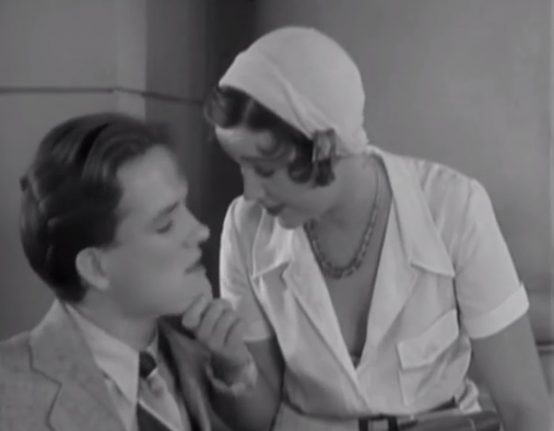
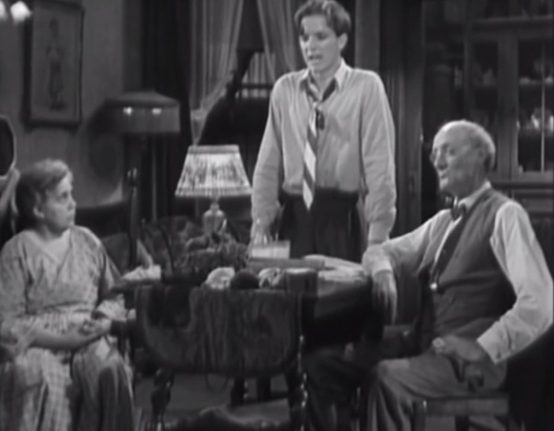

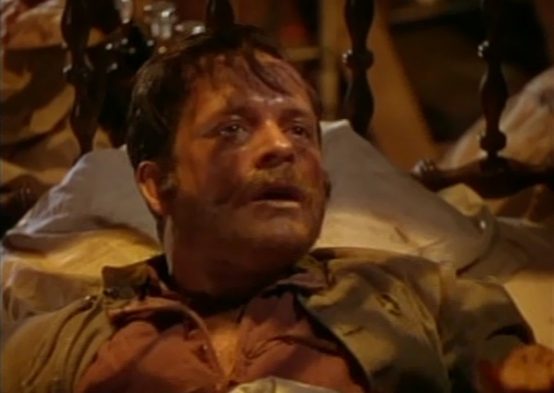


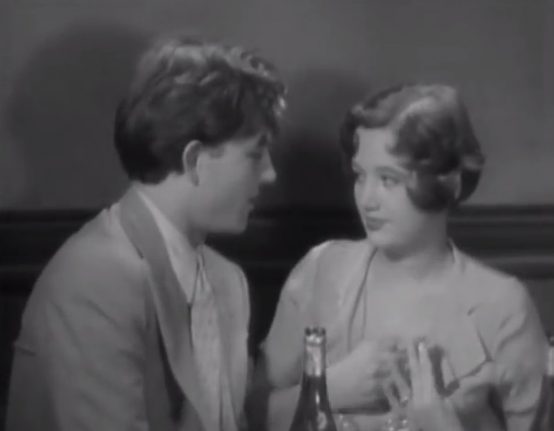





The more I see of Linden, the more I like his work. I don’t know which film it was, but all of a sudden I knew that voice from his GWTW bit. I did get chills.
Yes, Caftan, I think he’s an acquired taste—he’s someone I look forward to a lot now! I only went seeking out the GWTW bit a few years ago: I put on the movie just to find Linden. Didn’t recognize him at first, but then, yes, that voice! I wish he’d had more there, and I wish he’d done more in Hollywood after.
TCM showed this film again a couple weeks ago, so I was able to see it for the first time.
I certainly agree with your portrayal of the movie, which raised even my eyebrows. I was expecting something of this risque nature, but ATOC exceeded it. Especially the sequence after they’ve been dancing when Arline Judge goes on about how hot she is and constantly looks down her blouse, seemingly egging her escort on to do the same. And then she comments on how he doesn’t wear an undershirt and what that supposedly implies. And, lest their be any doubt, when she and her gal pals are in the cab, waiting for the guys to return, she offhandedly mutters, “I wonder if there’s a hotel in this neighborhood,” so you know where she wants to head.
And when she’s laying the trap for Linden’s character, having basically dismissed the two other guys who would take the fall with Linden, she says, “Now here comes a guy I could really go for,” prompting one of her friends to remind her that Linden is “taken,” to which Judge replies, “You remember what happened at Coney Island.” So, what I want to know is was that some kind of catch phrase of its time — such as “what happens in Vegas, stays in Vegas” or is it meant to suggest that she’s experienced as busting up relationships, something she probably excelled at under the Coney Island boardwalk.
Maybe you’ve caught the first five minutes by now, but Linden’s girlfriend (played by Rochelle Hudson), while certainly meant to be the “good girl,” isn’t entirely pure. Sitting on the front stoop of her brownstone with Linden’s hand firmly ensconced on her chest, she has no hesitation about agreeing to a “walk in the park” with him at 9:30 pm, but backs off not because of the hour, but because they have school tomorrow and he has homework to do. The pivotal scene in my estimation is after Linden flunks that oration, when he runs into Hudson, who can do nothing other than utter a simpering, “I think you’re getting depressed.” She invites him to dinner at her house, but Linden declines. Then he runs into Judge and her pals. Judge is about 180 degrees removed from Hudson in her attitude. She tells Linden to “be a man,” “get over it,” “nobody cares.” The cynicism is a large part of her character’s appeal.
I was also impressed by the production value, which made ATOC seem fresher than I expected it to be. It didn’t have that grainy patina of many films of its era, and looked as if it could have been shot in the 1950s. The dialogue between the protagonists also seemed to be well ahead of many of their contemporaries, and I don’t necessarily mean the actual words they spoke, but rather the delivery. Actors of that era were still transitioning into talkies and for many the rough go of it is easily apparent. Whereas Linden and Judge were still new at the craft and didn’t have to figure out how to leave the old ways behind.
I, too, would be interested in obtaining a DVD of this film if ever made available.